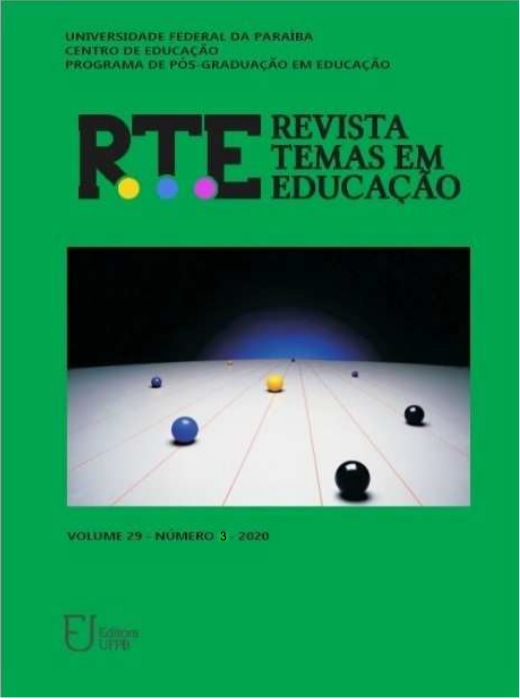THE COMPUTER AND ART-EDUCATION: REFLECTIONS ON LIMITS AND POTENTIALITIES OF THIS INTEGRATION
THE COMPUTER AND ART-EDUCATION: REFLECTIONS ON LIMITS AND POTENTIALITIES OF THIS INTEGRATION
DOI:
https://doi.org/10.22478/ufpb.2359-7003.2020v29n3.52595Keywords:
Art-Education, Computer, Pedagogical practicesAbstract
The present text, with a hermeneutic approach, reflects on the limits and potentialities of the computer in the formative processes of the art-education of students. We start from the following problematizations: What are the meanings and perceptions of teachers in the pedagogical experiences of art-education with the use of the computer? Can the computer in everyday school stimulate the development of creative abilities in the subjects or simply alienate them? The study aims to understand the relations of art-education and the ways of teaching and learning through the computer, in view of its potentialities and the perceptions of pedagogical experiences for the development of sensitive and singular knowledge in the world. We start from the hypothesis that the computer is often taken over an impoverished and operationalized representation, as something manufactured for consumption, which generates the loss of expressive, communicational sense and the fugacity of this cultural instrument in education. In turn, when stimulated by an artistic and sensitive look, it can be (re)created in new sociocultural manifestations,producing aesthetic-formative meanings and experiences in the field of art-education. We conclude that the computer is a human construction with potential for the promotion of creative creation and new sensitivities in the field of art-education, which can cause ruptures in educational modeling by the transformations itself that is able to engender in pedagogical practices.
Downloads
References
BARBOSA, A. M. (org.). Arte/educação contemporânea: consonâncias internacionais. São Paulo: Cortez, 2005.
BARBOSA, A. M. Inquietações e mudanças no ensino da arte. São Paulo: Cortez, 2003.
BARBOSA, A. M. A imagem no ensino da arte: anos 1980 e novos tempos. 8. ed. São Paulo: Perspectiva, 2010.
BERTOLETTI, A. O ensino das artes visuais na era das tecnologias digitais. Curitiba: InterSaberes, 2016.
BULHÕES, M. A. Transterritórios: campo da arte e internet. Visualidades, Goiânia, v. 8, p. 11-22, 2010.
CHAUÍ, M. Convite à filosofia. 12. ed. São Paulo: Ática, 1996.
CONTE, E.; HABOWSKI, A. C.; RIOS, M. B. Ressonâncias das tecnologias digitais na educação. Revista Ibero-Americana de Estudos em Educação, Araraquara, v. 14, n. 1, p. 31-45, jan./mar., 2019. DOI:10.21723/riaee.v14i1.11110
FLUSSER, V. O Universo das imagens técnicas. Elogia da superficialidade. Coimbra: Annablume, 2012.
GADAMER, H-G. Verdade e método. 7. ed. Petrópolis: Vozes, Bragança Paulista: EDUSF, 2005.
HABOWSKI, A. C.; CONTE, E.; TREVISAN, A. L. Por uma cultura reconstrutiva dos sentidos das tecnologias na educação. Educação & Sociedade, Campinas, v. 40, n. 2, p. 1-18, 2019. DOI: 10.1590/ES0101-73302019218349
HAN, B-C. Sociedade do cansaço. 2. ed. Petrópolis, RJ: Vozes, 2017.
LIPOVETSKY, G; SERROY, J. A estetização do mundo: viver na era do capitalismo artista São Paulo: Editora Companhia das Letras, 2015.
LEMOS, A. Cibercultura como território dominante. In: TRIVINHO, E.; CAZELOTO, E. (org.). A cibercultura e seu espelho: campo de conhecimento emergente e nova vivência humana na era da imersão interativa. São Paulo: ABCiber; Instituto Itaú Cultural, 2009, p. 38-46.
MERCADO, L. P. L. (org.). Novas Tecnologias na educação: reflexões sobre a prática. Maceió: Edufal, 2002.
PERRENOUD, P. 10 Novas competências para ensinar. Trad. Patrícia Chittoni Ramos. Porto Alegre: Artmed, 2000.
PILLAR, A. D. A educação do olhar no ensino das artes. 6. ed. Porto Alegre: Mediação, 2011.
PIRES, D. C. Arte e novas tecnologias. Canoas: UNIASSELVI, 2017.
POISSANT, L. Ser e fazer sobre a tela. In: DOMINGUES, Diana (org.). Arte e vida no século XXI: tecnologia, ciência e criatividade. São Paulo: Editora UNESP, 2003. Capítulo 7, p. 115-123.
RANCIÈRE, J. A partilha do sensível: estética e política. São Paulo: Ed. 34, 2005.
SANTAELLA, M. L.; NÖRTH, W. Imagem - Cognição, Semiótica, Mídia. São Paulo: Iluminaras, 2005.
TAROUCO, L. M. R.; FABRE, M-C. J. M.; TAMUSIUNAS, F. R. Reusabilidade de objetos educacionais. RENOTE- Revista Novas Tecnologias na Educação, Porto Alegre, v.1, n. 1, p. 1-11. 2003.
ZAMBONI, S. A pesquisa em arte: um paralelo entre arte e ciência. Campinas, SP: Autores Associados, 1998.
Downloads
Published
How to Cite
Issue
Section
License
Authors who publish in this journal agree to the following terms:
. Authors retain the copyright and grant the journal the right to first publication, with the work simultaneously licensed under the Licença Creative Commons Attribution that allows the sharing of the work with acknowledgment of authorship and initial publication in this magazine. . Authors are authorized to assume additional contracts separately, for non-exclusive distribution of the version of the work published in this journal (eg, publishing in institutional repository or as a book chapter), with acknowledgment of authorship and initial publication in this journal.
. Authors are permitted and encouraged to publish and distribute their work online (eg in institutional repositories or on their personal page) at any point before or during the editorial process, as this can generate productive changes, as well as increase impact and citation of the published work (See O Efeito do Acesso Livre).



















